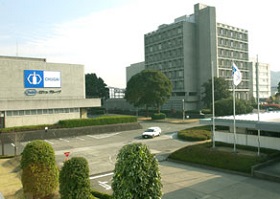A Phase III trial for the Alecensa (alectinib) lung cancer treatment developed by Tokyo-based Chugai Pharmaceutical will be stopped early based on the recommendation of an independent data monitoring group because the drug has met its primary endpoint and showed that patients were living "significantly longer" with the treatment when compared to crizotinib (Xalkori).
The company said in a press release that the study had "207 patients with ALK fusion gene positive advanced or recurrent NSCLC who either had not undergone chemotherapy or had undergone one chemotherapy regimen."
Chugai said "since the results showed that Alecensa significantly prolonged the progression free survival to a higher extent than anticipated, the committee decided to recommend an early discontinuation of the study."
 |
| Chugai's Tokyo headquarters |
The full results from the trial, Chugai said in a release, will be unveiled at an unspecified future medical meeting, adding that no particular safety problems were identified by the committee.
"The fact that the J-ALEX study received a recommendation by an (independent data monitoring committee) to be stopped early due to positive effects is great news and a blessing for the patients who are involved in the study," said Chugai's director and executive vice president, Dr. Yutaka Tanaka. "We are extremely happy that these results can offer hope and encouragement to patients in need to be treated with Alecensa."
Chugai, which is majority-owned by Roche ($RHBBY), announced last year the drug was given a U.S. FDA priority review and "breakthrough therapy" designation.
The treatment has already been available in Japan since 2014. Xalkori was launched in Japan in May 2012 and is covered under reimbursement for lung cancer patients.
- here's the release